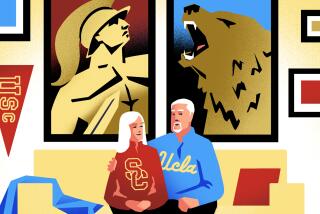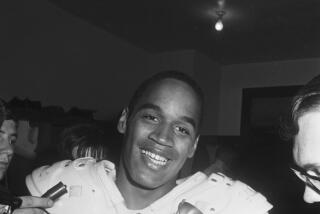Review: ‘Happy Valley’ has many views of Penn State’s Sandusky scandal
If you think college football is only a game, you might think that “Happy Valley” is no more than a place name that’s become attached to the bucolic area around Penn State University. And you would be wrong on all counts.
As examined in this thorough, thoughtful and disturbing documentary, college football appears something very much like a secular religion, and the aptly named Happy Valley is revealed as one of the cheerleading centers of unapologetic reverence for this Saturday afternoon spectacular. With all the consequences that level of veneration implies.
As directed by Amir Bar-Lev, responsible for the excellent “The Tillman Story,” “Happy Valley” doesn’t investigate this situation in a vacuum but rather in the context of perhaps the most controversial story to come out of college sports in recent years.
That would be the circumstances behind and the reaction to the crimes of Jerry Sandusky, a key member of the Penn State football coaching staff, whose conviction in 2012 of 45 counts of sexual abuse of young boys shattered the equilibrium of a community that had always believed that football was a symbol of something greater than itself, of something special.
One reason the residents of Happy Valley believed that was the personality and accomplishments of Penn State head coach Joe Paterno, whose belief in the college game as a character builder had grown so legendary over his more than 40 years at the university that fans took to calling him “St. Joe.”
As the Sandusky story unfolded, it was revealed that Paterno had been told by a graduate student of seeing Sandusky with a young boy in a sexual situation, and while the coach had reported this to his university superiors, neither he nor they had taken the further step of going to the police about what they knew.
Because of who Paterno was, because of his stature in the community, the moral question soon arose as to whether he had done enough, whether who he was created an obligation to do more. And, more to the point, did his lack of action invalidate all the years of positive things he had done at the university?
If Paterno’s involvement in the story is one of the documentary’s key focuses, the other, even more agonizing center of attention is Sandusky’s adopted son Matt Sandusky, who out of family loyalty told police nothing had happened to him and then, he says, “risked everything to tell the truth. In the end, here I sit, betrayed by them all.”
Coming from a troubled background and living in a house without running water, 10-year-old adoptee Matt viewed Sandusky “like a savior.” “The Sandusky name was like a golden ticket in this town. It was good to be next to him, to feel powerful, to feel that people envied me instead of looking down on me.”
Involving as all of this is, it is only part of the complex narrative that Bar-Lev examines, a story that attracted him, as the late NFL player and soldier Pat Tillman’s had previously, for a reason he explained in an interview before the film’s Sundance premier:
“When you have a story that has the kind of explosive momentum these stories do, you have to scratch your head and ask why people find this so interesting, what gives the story traction.”
Bar-Lev did more than that; he was open to exploring the surprisingly various points of view people had about the ramifications of the Sandusky situation. “Happy Valley” is especially good at revealing a mass desire to shift blame, showing how everyone the scandal touched wanted to focus on the aspect that made them the least responsible.
For the Penn State Board of Trustees, for instance, that meant distancing themselves as far as possible from the people who were involved. Paterno, to the continued shock of his family and the student body, was thrown under the bus despite his decades of services and summarily fired, as was the university president.
But if the Paterno family feels it was a Sandusky problem and Penn State felt it was a Paterno problem, the NCAA establishment felt it was a Penn State problem, hitting the university with a massive fine and banning it from lucrative bowl games for four years.
To Penn State film professor Matt Jordan, one of “Happy Valley’s” most articulate voices, singling out Penn State was “sanctimonious. But this is how we do things in America, we create a shaming spectacle to allow the culture to move on. It’s a way to avoid doing something about it.”
The deepest message of “Happy Valley” is that Jerry Sandusky was likely given the benefit of the doubt for years because of the powerful, unassailable place of college football. The notion that this scandal might have happened on any campus where sports is king is a lesson any number of major universities might want to think about.
Twitter: @KennethTuran
--------------------------------
“Happy Valley”
MPAA rating: None
Running time: 1 hour, 40 minutes
Playing: Laemmle’s Royal, West Los Angeles
More to Read
Only good movies
Get the Indie Focus newsletter, Mark Olsen's weekly guide to the world of cinema.
You may occasionally receive promotional content from the Los Angeles Times.







